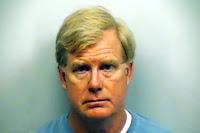
U.S. District Judge Mark Fuller
The note came from a source eight days ago: Look for the U.S. Eleventh Circuit Court of Appeals to force out District Judge Mark Fuller now that a ruling has been issued in the Don Siegelman case.That tip pretty much came true late today as Fuller announced that he will resign his lifetime appointment in the Middle District of Alabama, effective August 1. The resignation will take effect almost one year after Fuller was arrested on charges of beating his wife in an Atlanta hotel room last August.
Here is what our source wrote in an e-mail at 8:48 a.m. on May 21:
I suspect from rumblings I am hearing that now that the Siegelman case is off their plate that they are going to be letting Fuller go.
The source's words proved to be prescient, but they also raise at least two glaring questions:
* Was the resignation Fuller's idea or did the judicial and political establishment, under fire from groups that take violence against women seriously, force him out?
* Just how connected is the resignation to the Eleventh Circuit's May 20 ruling that denied Siegelman's most recent appeal? After all, Fuller was the trial judge in the Siegelman case, and his actions have been widely criticized by an array of legal experts.
The answer to the first question, in my view, clearly is yes. It's likely that powerful individuals in the judiciary and Congress informed Fuller that he was heading for impeachment--and that could lead to revelations about ugliness in his past that, so far, has been kept under wraps. That could prove embarrassing to high-profile GOP politicos, such as U.S. Senators Richard Shelby and Jeff Sessions, who supported Fuller's appointment, It also could prove embarrassing to those in the George W. Bush administration who pushed to get Fuller on the bench.
The second question is much more intriguing--and more difficult to answer. Our source's words could mean several things:
(1) The Eleventh Circuit, as a scheduling matter, simply wanted to get the Siegelman ruling out the way before focusing on the Fuller issue. The two were connected only in terms of timing;
(2) The Eleventh Circuit, and perhaps unknown political figures, came to an agreement to force Fuller out in exchange for upholding the Siegelman conviction;
(3) Option No. 2 was important because corruption connected to the Siegelman prosecution is so ugly that public confidence in the judicial system would be destroyed if it ever came to light;
(4) The best way to keep that unsightly story under wraps was to get rid of Fuller and keep Siegelman in prison, even though the record shows the former governor and codefendant Richard Scrushy were convicted of a "crime" that does not exist under federal law.
I suspect that some combination of items 2, 3, and 4 is in play, and that should sicken any American who gives a hoot about justice. It hints that an innocent man--one that powerful figures know is innocent--is being kept behind bars as part of a cover up. It hints that Siegelman's most recent appeal was not decided on the merits but on what certain individuals saw as the politically expedient path. Most troubling of all, it hints at obstruction of justice, of shadowy figures acting behind the scenes to rig an appellate ruling--and that points to possible criminality.
Getting Mark Fuller off the federal bench is a step in the right direction. But the story is far from over; we see signs that the corruption he helped spawn is far from over.
